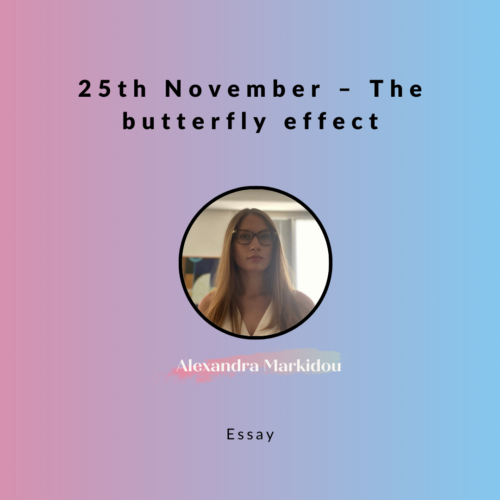Can we create beyond gender roles and expectations? Without falling for utopian views, we asked ourselves if women write differently than men and how it reflects on female characters’ construction. With the last three episodes, we get used to the interview format, but Pink Talks encompass all types of conversation: book and cine clubs and discussions with guests from academic, educational, political, sociological, or cultural backgrounds. Our freshly baked podcast focuses on Virginia Woolf’s book, A room of one’s own, and what better way to holistically analyze a book if not in a book club?
Angry or not?
The beauty of a book club lies in perspectives. At her time, Woolf was called hysterical and angry, but almost one hundred years later, we haven’t felt anger. Sophia Kanaouti describes her reading outside of the critical discourse: “she does describe what is happening, how women up to a point could not have property, but this is not done angrily. Anger does not consume her. There is a vision behind everything she writes.” Mariana Brasileiro sees a provocative yet respectful way to address the women’s rights problem, while Leah Chaney emphasizes Woolf’s interest in writing authentically instead of angrily. In this sense, the book’s title indicates the issue and offers a solution to the lack of discourse freedom.
Innovation and relevancy preservation
The fact we relate to a 1929 book proves the need for representation and its use in social change. The innovation resides in her vision. The author always looks and thinks ahead. She builds a past-present relationship that shows a search for solutions.
She encourages us to find our voice without fighting the patriarchal voice. Stop fighting against it, and start listening to yourself! Searching for one’s individuality is as necessary as the protest. One is not canceling the other. It is important to acknowledge that women have different experiences and other fights as human beings, friends, mothers, and lovers. For social and political change, we can offer both a protest and a vision of what can be changed.
Freedom of writing
Another part of Woolf’s vision is the freedom of writing about anything observable and moving beyond what is socially acceptable to write about. In order to create, we need a safe mental space in all settings: family, marriage, and friend groups. The room of one’s own may be interpreted both literally and figuratively as a physical room free of interruptions and a mental room free of comparisons, judgments, barriers, or gender expectations. For instance, her writing strategies are reflected in the humorous approach. It is a personal form of protest that embraces difficulties and creates art out of them.
Let’s make a mess of our own! A space where you allow messiness into the creational process and be yourself. Set free of the traditional caretaker role both for individuals and housekeeping!
The book club offers a safe space similar to what Virginia Woolf envisioned. A place where we are free to express, doubt, debate, deconstruct, learn and feel. Join us in the Pink Talks space by listening to the full episode or enrolling in the book club!
Show resources
Woolf, Virginia. A Room of One’s Own. Lisbon: Penguin Random House, 2018.
The British Library biography of Verginia Wolf: https://www.bl.uk/people/virginia-woolf
International Virginia Woolf Society: http://sites.utoronto.ca/IVWS/index.html
Virginia Woolf bibliography: https://en.wikipedia.org/wiki/Virginia_Woolf_bibliography
Bloomsbury group: https://www.britannica.com/topic/Bloomsbury-group
Nin, A. (1977). Delta of Venus. Harcourt Brace Jovanovich.
Delta of Venus by Anaïs Nin | Goodreads
Delta of Venus – Anais Nin: Books
anais nin – delta of venus – AbeBooks
Shriver, L. (2003). We Need to Talk About Kevin. Counterpoint.
We Need to Talk About Kevin: Shriver, Lionel
We Need to Talk About Kevin by Lionel Shriver
We Need to Talk About Kevin by Lionel Shriver, First Edition
Movie: Dir. Ramsay L., We Need to Talk About Kevin (2011).



